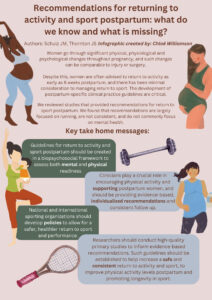Authors: Schulz JM, Thornton JS
In this blog we will explore the current research and gaps around return to activity and return to sport postpartum. The objective of our study (currently published in BJSM) was to determine what recommendations are currently being made for return to activity and sport postpartum and highlight the gaps that need to be addressed.
Why is this study important?
Women are often advised to return to activity as early as 6 weeks postpartum, despite undergoing significant physical, physiological and psychological changes throughout pregnancy. Some changes in pregnancy include cardiovascular changes, musculoskeletal changes, loss of bone mass and mental health concerns (such as postpartum depression). Despite these changes, there is minimal guidance regarding the management of postpartum concerns that arise in active women.
Traditional return to sport frameworks after musculoskeletal injury or surgery involve the assessment of both physical and mental readiness to return. However, there has been minimal consideration to managing postpartum return to sport, even though pregnancy can cause a similar amount of changes to the body as injury/surgery. Therefore, the development of postpartum-specific clinical practice guidelines to prevent short- and long-term consequences of return to activity and sport postpartum, and improve female longevity in sport, are critical.
How did the study go about this?
We conducted a scoping review of the literature, including any studies that made recommendations and/or guidelines for return to activity and sport postpartum, and excluding any studies that were not from a peer-reviewed scientific journal or did not include any guidelines/recommendations. We had a team of four reviewers who independently screened the studies for eligibility, with conflicts being resolved by a third-party reviewer. One reviewer extracted the data, which was cross-referenced by another reviewer. Thirty-three studies were included in the paper.
What did the study find?
Recommendations for return to activity
Out of the sixteen studies (48%) that had recommendations for return to activity half of them (8). stated that return to sport postpartum can begin once ‘medically safe’, around 6 weeks postpartum. However, this term was generally left undefined. Additionally, although most studies recommended engaging in 150 minutes of moderate-vigorous activity/week, recommendations for exercise parameters/progressions were often non-specific, with most studies recommending a gradual progression. Few studies recommended specific exercises (i.e., pelvic floor, aerobic, strength), however some studies recommended that walking and pelvic floor exercises can begin immediately postpartum.
Recommendations for return to sport
Only 11 (out of 33) studies had specific return to sport recommendations, mostly focused around running. Most of these studies recommended a gradual return to running, that should start after 12 weeks. Additionally, it was recommended by a few studies that volume should be built before intensity, and a strength program should be initiated before returning to sport. Only 6 studies mentioned the importance of mental health (i.e. postpartum depression, mental readiness) when considering return to activity and sport.
What are the key take-home points?
Guidelines for return to activity and sport postpartum should be created in a biopsychosocial framework to assess both mental and physical readiness. Clinicians play a crucial role in encouraging physical activity and supporting postpartum women, and should be providing evidence-based, individualized recommendations and consistent follow up. Additionally, national and international sporting organizations should develop policies to allow for a safer, healthier RTS and performance. Finally, researchers should conduct high-quality primary studies to inform evidence-based recommendations. Evidence-informed guidelines should be established to help increase a safe and consistent return to activity and sport, to improve physical activity levels postpartum and promote longevity in sport.
